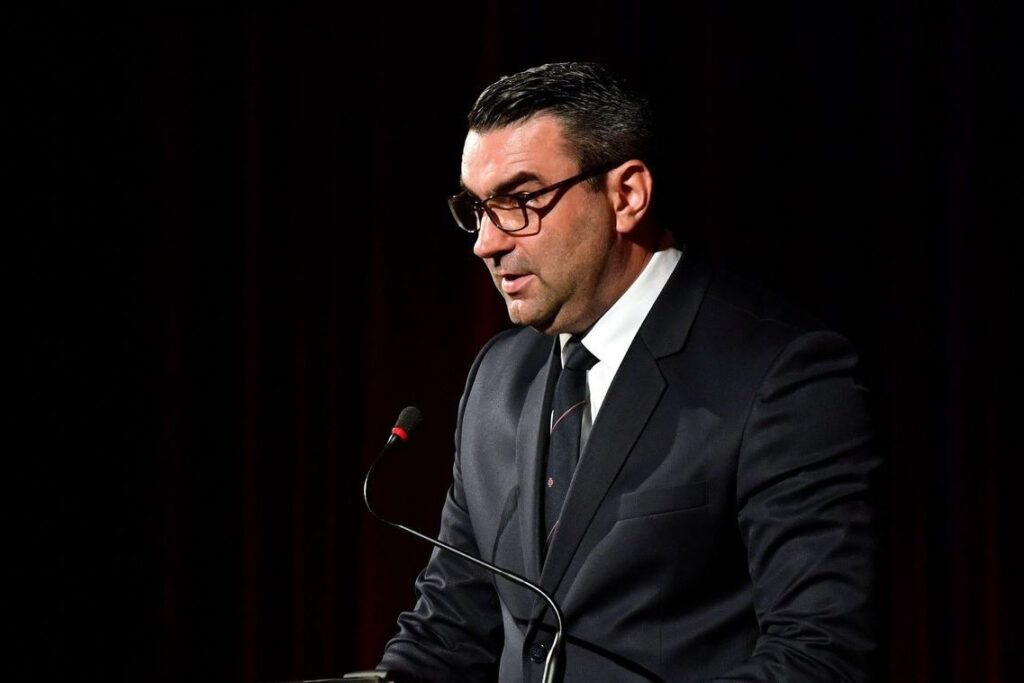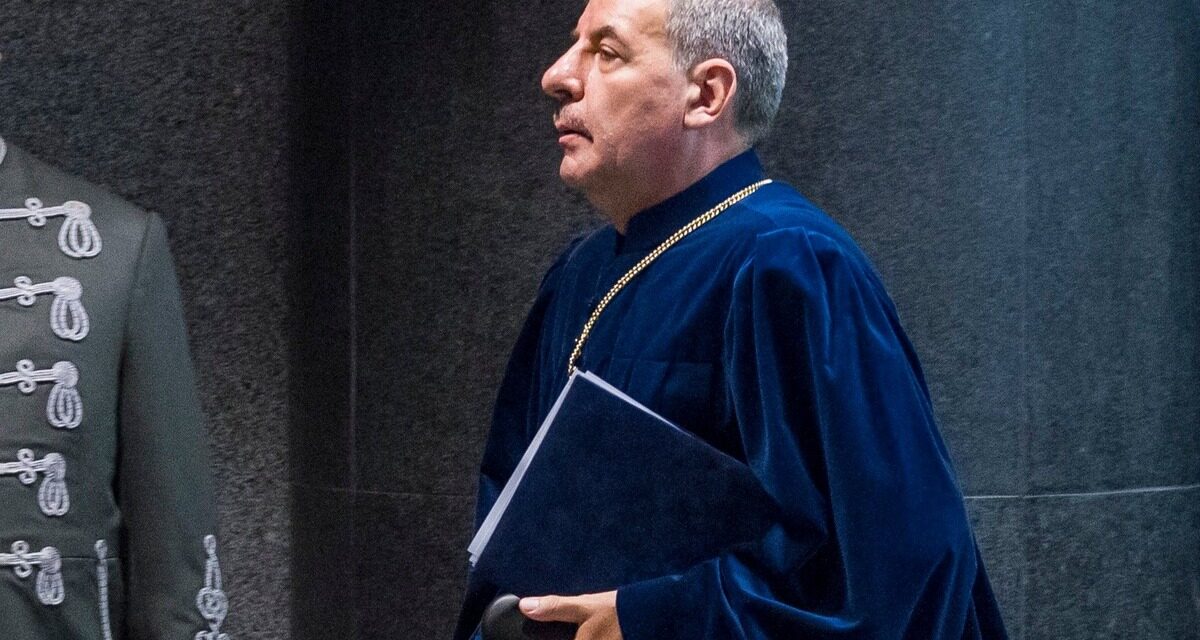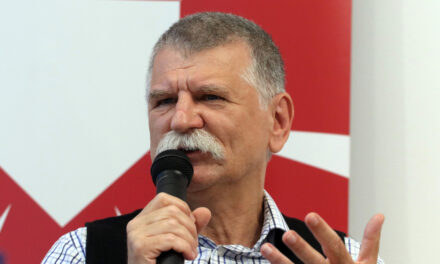The Fidesz–KDNP nominated Tamás Sulyok as its candidate for President of the Republic, who currently holds the position of President of the Constitutional Court since 2016. Where politics and political decisions influence legal decisions, the alarm bell must be sounded - this is how the candidate for the office of the head of state said earlier. According to him, he learned a lot from the peasants, because they always stand on the ground of reality, they watch what the future brings, since they live from it. Constitutional lawyer Zoltán Lomnici Jr. also pointed out in relation to the head of state candidate that he has no party affiliation and has a serious career as a lawyer.
The President of the Republic expresses the unity of the nation based on the letter and spirit of the Basic Law and guards the democratic unity of the state organization, stated to Magyar Nemzet . According to the constitutional lawyer, this is primarily not necessarily a purely political issue, but rather a question of protecting sovereignty, in which an all-parliamentary consensus could be formed on certain issues.
According to his words, since the unity of the nation cannot be understood without the assumption of responsibility for the Hungarians living abroad, stipulated in the Basic Law, therefore
until the left, especially Ferenc Gyurcsány, apologizes for their involvement in the shameful referendum of 2004, they have no moral basis to even take the question of the nation's unity on their lips.
He reminded: the leader of the Fidesz faction made it clear what the main aspect was regarding the nomination of Tamás Sulyok. Máté Kocsis , he said that the nomination is about suitability, and that according to the governing rules, the person proposed by the president of their association, Prime Minister Viktor Orbán, is the one who can best express national unity in the current situation, according to the governing parties.
He has no party affiliation, and their candidate is a serious, highly respected person who has completed a career as a lawyer.
For the Hungarian people, these must be convincing arguments, he noted. According to Zoltán Lomnici Jr., the candidate for the head of state of the governing parties will stand his ground well in the international arena as well. He recalled: Tamás Sulyok was elected by the Parliament as a member of the Constitutional Court with effect from September 27, 2014, since then he will be the first deputy president, and since 2016 he has been the president of the robed body.
Based on all of this, it can be stated that, according to the leader of the Fidesz faction, the candidate will certainly have the opportunity to make use of his experience as the first member of a highly prestigious judicial body as well as president
Zoltán Lomnici pointed out.

Zoltán Lomnici Jr. (Photo: MTI/Zoltán Máthé)
Index.hu important information about the candidate in its article:
Tamás Sulyok was born on March 24, 1956, into a real family of lawyers, in Kiskunfélegyháza. His father was a lawyer, but after 1945 he could no longer continue his practice, as he was removed from the bar for political reasons. He supported his family as a manual laborer for more than ten years, and only from 1957 was he able to find employment as a legal advisor. His mother worked as a teacher. Both of his brothers are lawyers, and their spouses are also lawyers. His sister, on the other hand, is a food industry engineer.
He was chased out of the county
He went to primary and then secondary school in Kiskunfélegyháza. After graduation, he was a soldier in Kalocsán. After eleven months of service in the Hungarian People's Army, he moved to Szeged, to the law faculty of the University of Szeged. When she told her father that she wanted to be a teacher, he said: that's a good thing, but it's hard to make a living. Years later, he managed to make use of his pedagogic inclination, since he always loved teaching at the university.
He obtained a law degree in 1980 and began his career as a court draftsman at the Csongrád County Court.
Already as a court draftsman, I realized that criminal law has many aspects that do not correspond to my mental makeup, so I started to study civil sciences. Only the blind did not see that in the eighties the state party gave specific instructions to specific people in specific criminal cases
he recalled his first court years.
Then he soon had to face the violence of the system. In 1982, when he passed the legal examination, the president of the county court - who did not really understand the profession, rather he was driven by political interests - told him that he would be appointed a criminal judge if he joined the MSZMP. He replied, thank you very much, but he does not want to be a criminal judge. The president looked at him coldly and told him to leave the county, because he would have to chase him. But at least he promised that much, if he leaves, he won't touch her.
He went to Kiskunfélegyháza as a legal advisor to the producer cooperative. He had to live a double life: he continued to live in Szeged, and from there he returned to work in his hometown.
According to him, he learned a lot from the peasants, because they always stand on the ground of reality, they watch what the future brings, since they live from it.
“It takes a lot of faith. If I take something today - he continued - I will harvest it, or if I feed the livestock, I can cut it." In his opinion, cooperatives had many positive features, which unfortunately the village and the Hungarian countryside lost after the regime change.
He tries to see the good in all the possibilities
He was able to work as a lawyer from 1991 until he was elected as a constitutional judge in September 2014. When asked why he chose the investigation of the legal status of the legal profession as the topic of his 2013 PhD thesis, he answered: during the party state, lawyers tried to survive this period, but many fell in the battle. For example, his father lost not only his practice, but also his entire fortune. He had the bad luck that the spouse of a client he represented in a demolition case at the end of the thirties became the first secretary of the Communist Party in Székesfehérvár after the war. Since his father was practicing law there, his fate was sealed.
interview with Index, he remembered this as follows:
I never heard anything bad about the system of so-called socialism from my father, he even considered it socially just, he never scolded it. He was able to start his life again because his children remained. He focused on that.
At home, he usually only heard positive things. His father was a man of faith, he believed that he had the right to take what God gave him. He benefits from this positive education to this day. According to him, he always tries to see only the good in the possibilities.
He was not interested in politics
- he became a member of the Constitutional Court from September 27. He also handles criticisms of the board in a practical way:
Whoever is elected as a constitutional judge becomes a public figure. If a person is criticized, it can have two consequences: he gets angry for the criticism, which is unnecessary because it leads nowhere; or you try to improve your work because professional criticism helps. However, I have nothing to do with political criticism, because I have never been interested in politics in my life.
His colleagues quickly accepted him, as on April 1, 2015, he was elected vice president of the board. One year later, from April 22, 2016, as the successor of Barnabás Lenkovics, he also held the powers of the president as deputy president. On November 22, 2016, the Parliament elected him as the President of the Constitutional Court. After more than seven years of presidency, another challenge awaits him: he is expected to move from Donáti Street to the Sándor Palace.
Cover photo: Tamás Sulyok (MTI/Zsolt Szigetváry)












